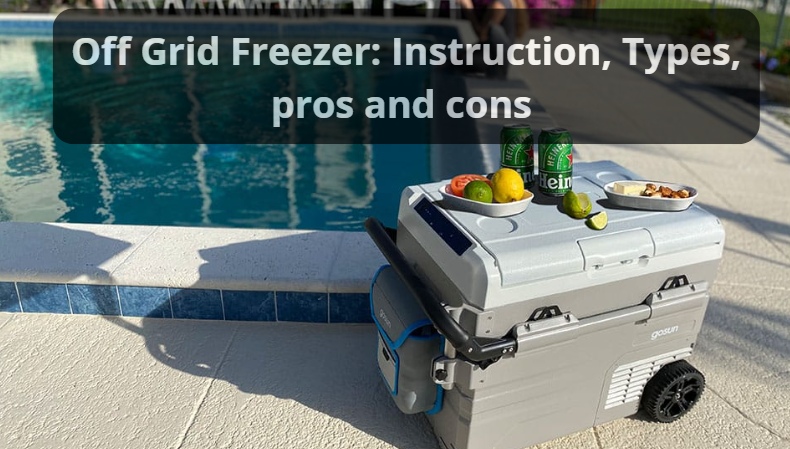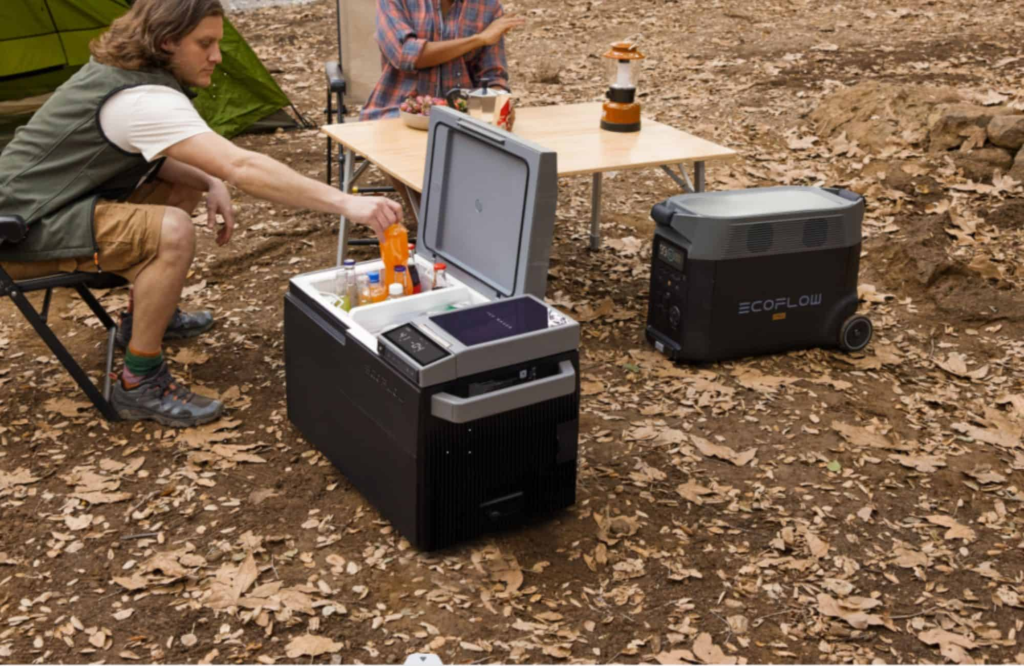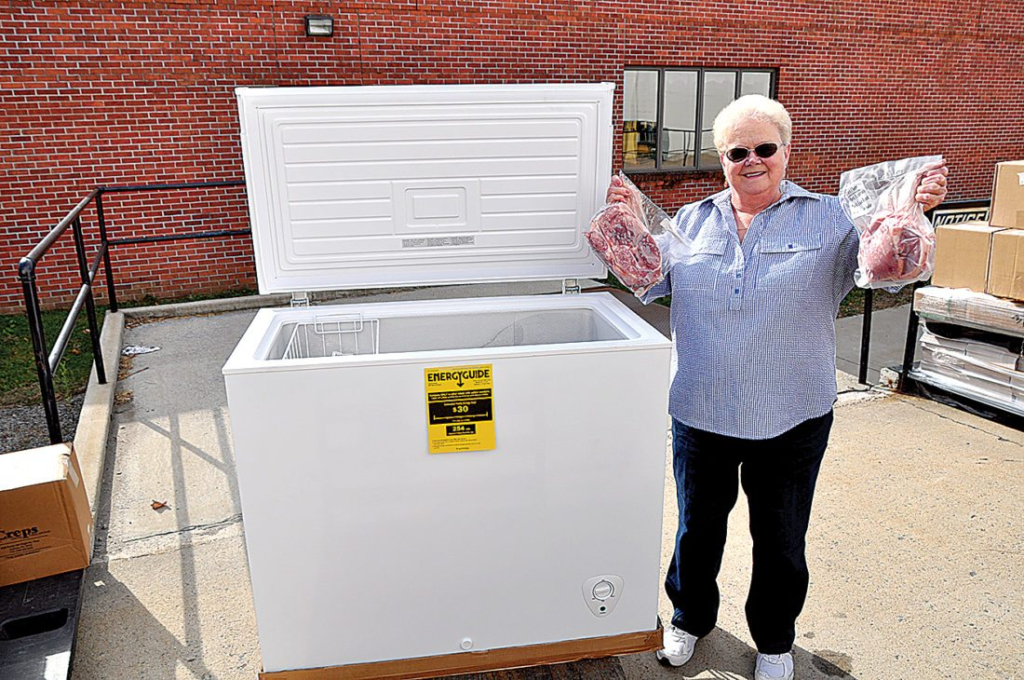
Table of Contents
Introduction
Off Grid Freezer offers a sense of freedom and self-reliance, allowing individuals to detach from the constraints of traditional power systems. When it comes to off-grid living, an essential consideration is the ability to preserve food, especially perishables. This is where off-grid freezers come into play, providing the luxury of frozen goods without relying on the grid. In this article, we will explore the world of off-grid freezers, their benefits, types, factors to consider, installation tips, efficiency optimization, real-life applications, and answer some frequently asked questions.

Image source: EA Law
Pros and cons of Off-Grid Freezers
- Lower Energy Consumption
Off-grid freezers typically consume a fraction of the energy compared to their conventional counterparts. By reducing reliance on the grid, off-grid freezers contribute to energy efficiency and lower utility bills. - Preservation of Food and Availability of Frozen Produce
Off-grid freezers ensure your food stays fresh and nutritious for extended periods, preserving the quality of perishable items such as meat, vegetables, and dairy products. - Suitable for Camping, RVs, and Remote Areas
Off-grid freezers are a game-changer for outdoor enthusiasts, campers, and RV owners. They offer the convenience of frozen food during road trips, camping adventures, and even off-road expeditions. - Independence from Fluctuations and Power Outages
By decoupling from the grid, off-grid freezers provide a reliable cooling solution even during blackouts or instances of fluctuating power supply.
- Energy Dependency
Off-grid freezers rely on alternative energy sources such as solar power or wind turbines. The efficiency of these sources can be affected by weather conditions, seasonal changes, and geographic location. In periods of low sunlight or minimal wind, the freezer may not receive sufficient power, leading to temperature fluctuations or spoilage of contents. - Initial Cost
Off-grid freezer systems can have a higher upfront cost compared to conventional grid-connected freezers. This includes the expense of purchasing and installing renewable energy systems, batteries, and inverters. The initial investment may be a barrier for some individuals or households. - Limited Storage Capacity
Off-grid freezers may have limited storage capacity compared to larger grid-connected models. This can be a significant drawback for users who require a larger storage space for preserving food, especially in situations where bulk storage is necessary. - Maintenance and Repairs
Maintaining and repairing off-grid systems can be more complex and may require specialized knowledge. Troubleshooting issues with solar panels, batteries, or inverters can be challenging for individuals without technical expertise, and finding qualified technicians in remote areas can be difficult. - Battery Lifespan
Off-grid freezers typically use batteries to store energy for use during periods of low renewable energy production. The lifespan of these batteries can be limited, and replacements can be costly. Ensuring proper battery maintenance and replacement can be an ongoing concern.
Types of Off-Grid Freezers
Propane Freezers Propane freezers use propane gas as a fuel source for cooling.
They employ the principles of absorption cooling, making them incredibly efficient and suitable for off-grid applications.
- Unlike conventional compressor-based freezers, propane freezers operate silently, making them ideal for quiet and peaceful off-grid living.
- These freezers are highly energy-efficient, as they don’t require any electricity for cooling. Propane is combusted to create heat, which is then used for the cooling process.
- One downside is that propane freezers require a propane supply, which can be an additional cost. However, they allow for complete independence from the power grid.
Solar-Powered Freezers Solar-powered freezers harness the energy of the sun to provide cooling capabilities.
They are an environmentally friendly option, converting sunlight into electricity through solar panels.
- Solar-powered freezers offer the advantage of utilizing renewable energy, making them sustainable and eco-friendly.
- They are versatile and can be used in various off-grid situations, from remote cabins to mobile applications like RVs.
- The primary challenge of solar-powered freezers is their dependence on sunlight. Cloudy days or shaded areas can impact their performance, requiring alternative power sources or battery storage.
12V DC Freezers 12V DC freezers are designed to operate directly on a 12-volt DC power supply.
They are commonly used in off-grid setups powered by solar panels or batteries.
- With their low power requirements, 12V DC freezers are highly efficient, making them a suitable choice for off-grid lifestyles.
- These freezers often come with energy-saving features, such as low-power consumption settings and adjustable cooling levels, further optimizing their efficiency.
- It’s important to ensure an adequate 12V power supply for uninterrupted operation of these freezers.
Factors to Consider When Choosing an Off-Grid Freezer
When selecting an off-grid freezer, several factors should be taken into account to meet your specific needs and maximize performance.
- Capacity and Size: Consider the storage capacity of the freezer, ensuring it meets the requirements of your household or intended usage. The physical dimensions should also be suitable for the space available.
- Power Requirements and Energy Efficiency: Evaluate the power requirements of the freezer and ensure it aligns with your off-grid power system. Look for energy-efficient models that minimize energy consumption.
- Durability and Reliability: Off-grid environments can be challenging, so choose a freezer that can withstand harsh conditions and is built with durable materials. Consider the reputation of the manufacturer and read customer reviews for reliability assessment.
- Cost and Maintenance Considerations: Evaluate the initial cost of the freezer and its long-term maintenance requirements. Factor in the availability of spare parts and the ease of maintenance, should the need arise.

Image source: www.bharatagritech.com
How to install Off Grid Freezer
Installing an off-grid freezer requires careful planning and consideration of various factors. Here are some essential steps to guide you during the process:
- Select the Ideal Location: Choose a location that is well-ventilated and away from direct sunlight or other heat sources. Adequate clearance should be provided, especially for propane and solar-powered freezers.
- Ensure Proper Insulation: Proper insulation is crucial to reduce energy loss and keep the internal temperature stable. Insulate the surroundings of the freezer with suitable materials to maintain optimal cooling efficiency.
- Connect to the Power Source: Follow the manufacturer’s instructions to connect the freezer to the appropriate power source. This may involve connecting to a propane supply, solar panels, or a 12V DC power system.
- Start-Up and Initial Set-Up: Power on the freezer and allow it to cool down for a few hours before loading it with perishable items. Follow the manufacturer’s guidelines for the initial set-up process.
Tips for Optimizing Off-Grid Freezer Efficiency
To ensure your off-grid freezer operates optimally and efficiently, consider implementing the following tips:
- Proper Insulation and Placement: Make sure the surrounding area of the freezer is well-insulated to minimize heat gain. Keep the freezer away from direct sunlight, heat sources, and open doors or windows.
- Temperature Regulation and Monitoring: Set the freezer’s temperature to an appropriate level to balance energy consumption with food preservation. Use a thermometer to regularly monitor the internal temperature and adjust as necessary.
- Organization and Loading Techniques: Arrange food items in an organized manner, ensuring proper air circulation within the freezer. Avoid overloading the freezer, as it can hamper airflow and reduce cooling efficiency.
- Regular Cleaning and Defrosting: Clean the freezer regularly to prevent the accumulation of frost or ice, which can reduce cooling efficiency. Defrost the freezer when a significant amount of ice buildup occurs to maintain optimal performance.

Image source: LinkedIn
Examples of Off-Grid Freezer Applications
Off-grid freezers find applications in various scenarios, offering convenient cooling solutions beyond traditional power grids:
- Off-Grid Homes and Cabins: Off-grid homeowners and cabin dwellers can enjoy frozen food without relying on public utilities, enhancing their self-sufficiency and sustainability.
- Remote Research Stations and Field Camps: Scientists and researchers working in remote locations can benefit from off-grid freezers to store samples, perishable supplies, and maintain a proper food supply.
- Long-Term Camping and RV Living: Travelers living in RVs or camping long-term can preserve their food and enjoy the convenience of frozen meals during their adventures.
- Sustainable Farming and Homesteading: Off-grid freezers are crucial in sustainable farming, allowing farmers to store harvests and maintain a year-round supply of frozen produce.
FAQs
Can I use an off-grid freezer during winter in cold climates?
Absolutely! Off-grid freezers are designed to operate efficiently in various climates, including cold environments. Just ensure proper insulation and regular temperature monitoring.
Are off-grid freezers noisy?
No, not necessarily. Propane and solar-powered freezers operate silently, while some 12V DC models may produce a low hum that is usually not intrusive.
What is the lifespan of an off-grid freezer?
The lifespan of an off-grid freezer depends on the specific model, maintenance, and usage. On average, these freezers can last anywhere from 10 to 20 years.
Can off-grid freezers be used in boats or marine environments?
Yes, off-grid freezers can be used in boats and marine environments. They offer a reliable solution for keeping food fresh during extended boating trips.
READ ALSO: Ice Machine Rental: Is it worth it?
Conclusion
Off-grid freezers provide a reliable and efficient solution for preserving food and enjoying the convenience of frozen produce without relying on the grid. Whether you’re living in an off-grid home or cabin, exploring the outdoors in an RV, or working in remote locations, off-grid freezers offer the freedom and independence to maintain a proper food supply.
By choosing the right type of off-grid freezer, considering factors such as capacity, power requirements, durability, and maintenance, you can enhance your off-grid living experience. Proper installation, insulation, and regular maintenance will optimize the efficiency and performance of your freezer, ensuring it operates at its best for years to come.
With off-grid freezers, you can embrace a sustainable and self-reliant lifestyle, free from the constraints of traditional power systems. Say goodbye to concerns about power outages, fluctuating energy supply, or limited access to fresh food. Invest in an off-grid freezer and harness the freedom to enjoy frozen goods wherever your off-grid journey takes you.
